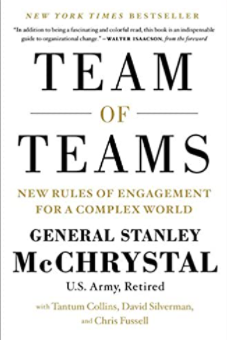A Community of Communities
This story illustrates what is possible when a well networked community of communities stand together in their ambitions to love and serve their city.

In last week’s edition we referenced a talk given by Lucas Pulley at the first of The Underground Network’s ‘Core Sunday’ gatherings. These gatherings bring leaders from throughout the network together annually. The clip above is taken from their second gathering and is actually a story about something that happened to Lucas during the week. It’s just too good of a story not to share and it carries forward the theme and further illustrates how much this network of amateurs embodies the very heart of what is intended by the charge to ‘Be Pedestrian.’
Tomy Wilkerson, before telling the story in the above clip, made reference to a book that also and coincidentally came up in the conversation between Jon and William Cook in the most recent episode of The Work Ethic podcast. In the conversation between Jon and Will, the book, Team of Teams, came up after Jon asked Will why decentralization was so important to the vision of lemonGRAFT.

Tomy referenced the book and talked about how the military had to embrace decentralization as they started facing an enemy made up of decentralized, networked cells in the middle east. In Team of Teams, General Stanley McChrystal shows how the challenges they faced in Iraq can be relevant to countless businesses, nonprofits, and organizations today. In periods of unprecedented crisis, leaders need practical management practices that can scale to thousands of people—and fast. Al Qaeda in Iraq was a decentralized network that could move quickly, strike ruthlessly, then seemingly vanish into the local population. When General Stanley McChrystal took command of the Joint Special Operations Task Force in 2004, he quickly realized that conventional military tactics were failing. The allied forces had a huge advantage in numbers, equipment, and training—but none of that seemed to matter. To defeat Al Qaeda, they would have to combine the power of the world’s mightiest military with the agility of the world’s most fearsome terrorist network. They would have to become a "team of teams''—faster, flatter, and more flexible than ever. Ultimately arriving at the moral that by giving small groups the freedom to experiment and share what they learn across the entire organization, teams can respond more quickly, communicate more freely, and make better and faster decisions.
Much like last week’s edition highlighted the advantage that the amateur hobbyist had over the heavily resourced and well trained reps of major institutions from around the globe, Team of Teams is a tale of underdogs gaining huge advantage because of decentralization. The Underground Network has, for the last 15 years, been planting micro-churches all over the city and working to network them together under a set of driving values and a commitment to Jesus’ vision for the Kingdom of God, “on Earth as it is in Heaven.” This story illustrates what is possible when a well networked community of communities stand together in their ambitions to love and serve their city. Lucas happened to be the one that walked with the man that got robbed in the story, but it is the network that makes for such a powerful response. The beautiful thing about this story is that it is just a story of ordinary neighbors being neighborly on purpose. This network isn’t exactly organized, the connections are not exactly planned, but the nature of this organic collective makes for a heroic presence of pedestrians in our city.
Until next time, be pedestrian.
